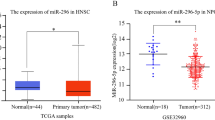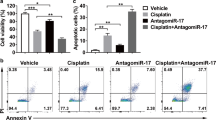Abstract
miR-21 as a tumor oncogenic molecule has been reported. However, whether miR-21 can affect the sensitivity of oral squamous cell carcinoma (OSCC) cells to cisplatin remain unclear. The aim of this study is to evaluate the roles of miR-21 in the sensitivity of OSCC cells to cisplatin. RT-PCR assay was performed to detect the expression of miR-21 in 10 pairs of OSCC and noncancerous tissue samples. Then As-miR-21 oligonucleotides were used to down the miR-21 expression. Finally, the effects of miR-21 downregulation the sensitivity of OSCC cells (CA-27) to cisplatin in vitro were also detected. The level of miR-21 expression in OSCC tissues was significantly higher than that in corresponding noncancerous tissues. Down the expression of miR-21 could significantly inhibit growth and induce apoptosis of CA-27 cells. Moreover, downregulation of miR-21 could sensitize CA-27 cells to cisplatin possibly by increasing cisplatin induced apoptosis. This study demonstrated that combination of cisplatin application with miR-21 downregulation might be a potential strategy for the treatment of human OSCC.



Similar content being viewed by others
References
Friedman RC, Farh KK, Burge CB et al (2009) Most mammalian mRNAs are conserved targets of microRNAs. Genome Res 19:92–105
Bartel DP (2004) MicroRNAs: genomics, biogenesis, mechanism, and function. Cell 116:281–297
Croce CM (2009) Causes and consequences of micro-RNA dysregulation in cancer. Nat Rev Genet 10:704–714
Alvarez-Garcia I, Miska EA (2005) MicroRNA functions in animal development and human disease. Development 132:4653–4662
Cho WC (2007) OncomiRs: the discovery and progress of microRNAs in cancers. Mol Cancer 6:60
Dai Z, Huang Y, Sadee W (2004) Growth factor signaling and resistance to cancerchemotherapy. Curr Top Med Chem 4:1347–1356
Huang Y, Anderle P, Bussey KJ et al (2004) Membrane transporters and channels: role of the transportome in cancer chemosensitivity and chemoresistance. Cancer Res 64:4294–4301
Filipowicz W, Jaskiewicz L, Kolb FA et al (2005) Post-transcriptional gene silencing by siRNAs and miRNAs. Curr Opin Struct Biol 15:331–341
Blower PE, Chung JH, Verducci JS et al (2008) MicroRNAs modulate the chemosensitivity of tumor cells. Mol Cancer Ther 7:1–9
Baulcombe D (2002) DNA events: an RNA microcosm. Science 297:2002–2003
He L, Hannon GJ (2004) MicroRNAs: small RNAs with a big roll in gene regulation. Nat Rev Genet 5:522–531
Sontheimer EJ (2005) Assembly and function of RNA silencing complexes. Nat Rev Mol Cell Biol 6:127–138
Bentwich I (2005) A postulated role for microRNA in cellular differentiation. FASEB J 19:875–879
Ciafre` SA, Galardi S, Mangiola A et al (2005) Extensive modulation of a set of microRNAs in primary glioblastoma. Biochem Biophys Res Commun 334:1351–1358
Chan JA, Krichevsky AM, Kosik KS (2005) Microrna-21 is an antiapoptotic factor in human glioblastoma cells. Cancer Res 65:6029–6033
Sorrentino A, Liu CG, Addario A et al (2008) Role of microRNAs in drug-resistant ovarian cancer cells. Gynecol Oncol 111:478–486
Meng F, Henson R, Lang M, Wehbe H et al (2006) Involvement of human micro-RNA in growth and response to chemotherapy in human cholangiocarcinoma cell lines. Gastroenterology 130:2113–2129
Moriyama T, Ohuchida K, Mizumoto K et al (2009) MicroRNA-21 modulates biological functions of pancreatic cancer cells including their proliferation, invasion, and chemoresistance. Mol Cancer Ther 8:1067–1074
Author information
Authors and Affiliations
Corresponding author
Additional information
This work was supported by the Dr. start-up funding of the 2nd hospital of Harbin Medical University, the funding of Heilongjiang Health department, 2010-071.
Rights and permissions
About this article
Cite this article
Wang, W., Songlin, P., Sun, Y. et al. miR-21 inhibitor sensitizes human OSCC cells to cisplatin. Mol Biol Rep 39, 5481–5485 (2012). https://doi.org/10.1007/s11033-011-1350-9
Received:
Accepted:
Published:
Issue Date:
DOI: https://doi.org/10.1007/s11033-011-1350-9




